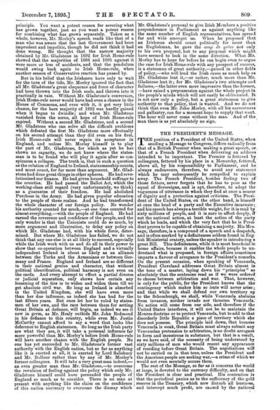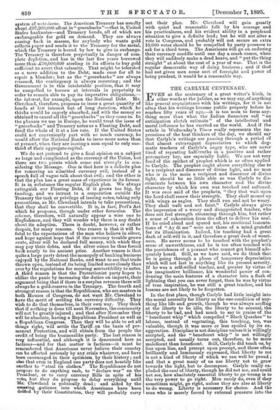THE PRESIDENT'S MESSAGE.
THEposition of a President of the United States, when sending a Message to Congress, differs radically from that of a British Premier when making a great speech, or.
that of a French President when delivering an address intended to be important. The Premier is fettered by colleagues, fettered by his place in a Monarchy, fettered, above all, by his responsibility to Parliament, and he always endeavours, therefore, to avoid any statement which he may subsequently be compelled to explain away. The French President, besides feeling two of those fetters, never forgets that he has to pose as the equal of Sovereigns, and is apt, therefore, to adopt the vagueness of utterance in which they find at once a source of dignity and a protection against criticism. The Presi- dent of the United States, on the other hand, is himself at once the head of a party and the Executive incarnate; and his speech has always a. terrible weight, for it is read by sixty millions of people, and it is sure to affect deeply, if' not the national action, at least the action of the party which he leads, and which the very fact that be is Presi- dent proves to be capable of obtaining a, majority. His Mes- sage, therefore, is a compound of a speech and a despatch, and is often marked by a definiteness seldom found in Eng- lish Ministerial oratory, unless the speaker is introducing a great Bill. This definiteness, while it is most beneficial in home affairs, because it enables the whole people to un- derstand what is proposed, in foreign affairs sometimes imparts a flavour of arrogance to the President's remarks. On the present occasion, when speaking of Venezuela, President Cleveland addresses Great Britain almost in the tone of a master, laying down his " principles " se absolutely that the sentences read as if we were ordered- to choose between arbitration and war. That, however, is only for the public, for the President knows that the contingency which makes him so irate will never arise ; and that while we shall defend our own territory up to the Schomburgk, we shall, while Venezuela abstains from invasion, neither invade nor threaten Venezuela,: No action will come from our side, and therefore if the United States interferes, it will not be to maintain the Monroe doctrine or to protect Venezuela, but to add to that disorderly little Republic a piece of territory which she does not possess. The principle laid down, that because Venezuela is weak, Great Britain must always submit any Venezuelan pretension to arbitration, is no doubt arrogant in form and monstrous in substance, but that is a result, as we have said, of the necessity of being understood, by sixty millions of men who would resent any appearance of receding before Great Britain. The negotiations will not be carried on in that tone, unless the President• and the American people are seeking war,—a crime of which we would not even mentally accuse them.
The rest of the Message, so far as it concerns the world at large, is devoted to the currency difficulty, and on that the President is clear and practical. His contention is that the periodical panics as to the sufficiency of the gold reserve in the Treasury, which now disturb all business, and intercept much profit, are caused by the national system of note-issue. The American Treasury has usually about £97,200,000 afloat in" greenbacks "—that is, United States banknotes—and Treasury bonds' all of which are exchangeable for gold on demand. They are always eoniing back in masses, for anybody who wants gold collects paper and sends it to the Treasury for the metal, which the Treasury is bound by law to give in exchange. The Treasury is therefore perpetually in danger of com- plete depletion, and has in the last five years borrowed more than £50,000,000 sterling in its efforts to buy gold sufficient to avert that calamity. That might be tolerated as a mere addition to the Debt, made once for all to repair a blunder; but as the " greenbacks " are always reissued, the contingency is always recurring ; and the Government is in this intolerable position, that it may be compelled to borrow at intervals in perpetuity in order to remain able to pay its imperative obligations,— the interest, for example, upon the National Debt. Mr. Cleveland, therefore, proposes to iasue a great quantity of bonds at low interest but of long • duration, which he thinks would be eagerly absorbed, and- with the money% so obtained to cancel all the " greenbacks " as they come in. In the phrases we use in Europe, he would treat the issue of " greenbacks " and Treasury notes as a. Floating Debt, and fund the whole of it at a low rate. If the United States could not conveniently part with so much currency, he would allow the National Banks to issue more notes than at present, when they are issuing a sum equal to only one- third of their aggregate capital.
We do not pretend to give a final opinion on a subject so large andcomplicated as the currency of the Union, but there are two points which come out strongly in con- sidering the Message. One is that here is a definite plan for removing an admitted currency evil, instead of a speech full of vague talk about that evil; and the other is that the plan has a great mass of eiperience in its favour. It is in substance the regular English phut. We always extinguish our Floating Debt, if it grows too big, by funding, and we intrust to a corporation outside the Treasury the task or privilege of issuing notes, taking only precautions as Mr. Cleveland intends to take precautions, that they shall be convertible. It is, in fact, Peel's Act which he proposes, though under other formulas. The scheme, therefore, will naturally appear a wise one to Englishmen, and they will wonder why there is any doubt about its adoption. There is doubt, however, or rather despair, for many reasons. One reason is that it will be fatal to the expectations of the men who believe in silver, and hope against hope that if the currency trouble grows acute, silver will be declared full money, with which they may pay their debts, and the silver ounce be thus forced back nearly to its ancient price. Another reason is that quite a large party detest the monopoly of banking business enjoyed by the National Banks, and want to see that trade thrown open, instead of its being limited more closely than over by the regulations for securing aonvertibility to notes. A _third reason is that the Pretectionist party hopes to utilise the panic by increasing the duties on imports, their argument being that if there is a surplus revenue there will always be a gold-reserve in the Treasyy. The fourth and strongest reason is that the Republicans who are masters in both Houses of Congress, do not, want Mr. Cleveland to have the merit of settling the currency difficulty. They wish to do that themselves, in their own way. They think that if nothing is done till next November, the community will not be greatly injured ; and that after November they will be absolute, having a Repnblican President as well as a Republican Congress. Then they will be able to set all things right, will settle the Tariff ,on the basis of per- inanent Protection, and will obtainjrona the people the credit of being the businesslike, party, The last reason is very influential, and although it is denounced here as factious—and for that matter is factious—it must be remembered that Americans never believe their country can be affected seriously by any ,crisis whatever, and have been encouraged in their optimism, by their history; and also that even in England one party does not heartily like another to "steal its clothes.' The Republicans do not propose to do anything rash, to "declare war" on the President, or to carry currency Bills in spite of his veto, but they do propose to delay everything until Mr. Cleveland is politically dead ; and aided by the missing .patience into which Americans have been drilled by their Constitution, they will probably carry out their plan. Mr. Cleveland will gain greatly with quiet and reasonable folk by his courage and his practicalness, and his evident ability in a perplexed situation to give a definite lead; but he will not alter a vote in Congress, and probably will not secure an extra 10,000 votes should he be compelled by party pressure to ask for a third term. The Americans will go on enduring their currency muddle until one day a crash comes, when they will suddenly make a dead heave, and "put the thing straight" at about the cost of a year of war. That is the regular democratic way of doing business ; and if God had not given men some sort of foresight and power of being prudent, it would be a reasonable way.























































 Previous page
Previous page